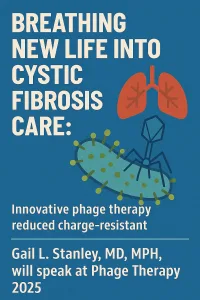 In a promising breakthrough against antibiotic-resistant infections, researchers have harnessed personalized bacteriophage therapy to combat Pseudomonas aeruginosa in adults with cystic fibrosis (CF). The innovative approach—designed to exploit bacterial “trade-offs” that weaken resistance or virulence—was used to treat nine CF patients with compassionate-use nebulized phage therapy.
In a promising breakthrough against antibiotic-resistant infections, researchers have harnessed personalized bacteriophage therapy to combat Pseudomonas aeruginosa in adults with cystic fibrosis (CF). The innovative approach—designed to exploit bacterial “trade-offs” that weaken resistance or virulence—was used to treat nine CF patients with compassionate-use nebulized phage therapy.
The results were encouraging: bacterial load in patients’ lungs dropped significantly without disturbing the broader microbiome, and no adverse effects were reported. More intriguingly, the therapy induced evolutionary changes in the bacteria that appeared to reduce both drug resistance and harmfulness. Patients also showed improved lung function, suggesting a dual benefit from reduced bacterial density and phage-driven bacterial weakening.
As the world faces a mounting antimicrobial resistance (AMR) crisis, this targeted and evolutionary-informed strategy marks a potential paradigm shift—especially for hard-to-treat infections in chronic conditions like CF.
Dr. Gail L. Stanley, MD, MPH, will share insights from this pioneering work at the upcoming Phage Therapy 2025 conference, where global experts will explore the clinical frontier of bacteriophage-based medicine.
